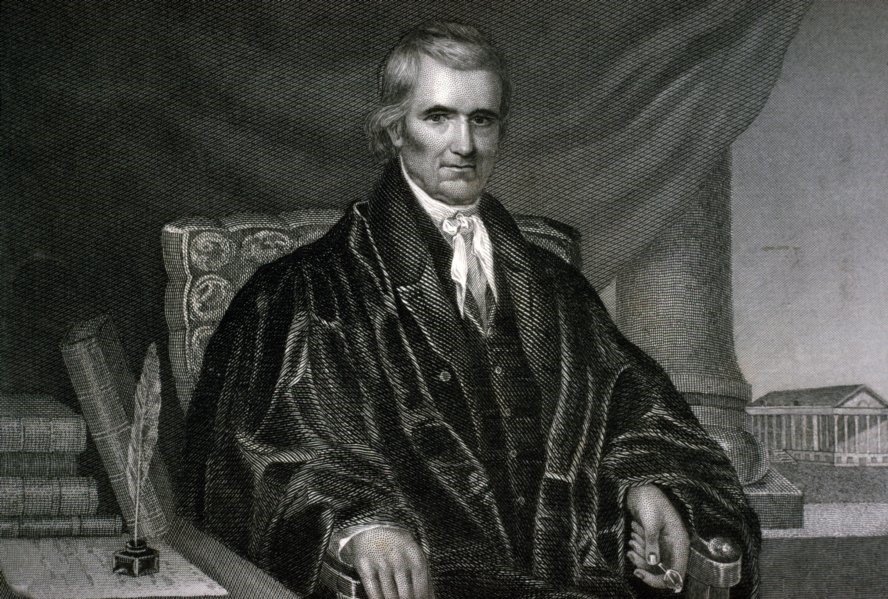Nelson Lund Replies to His McCulloch Critics
My essay on McCulloch challenges the conventional view that John Marshall’s opinion is both important and admirable. That view is half-right. This extremely important opinion was legally flawed, and it has been used to undermine the Constitution’s limits on congressional power. I am grateful to Kevin Gutzman for supplementing my analysis with additional historical background, some of which was unfamiliar to me. The other three responses criticize my essay with varying levels of intensity, but without refuting anything I actually said.
Michael M. Uhlmann
Michael M. Uhlmann’s characteristically vivid and erudite essay is interesting and informative. Oddly, however, it has virtually nothing to do with what I wrote. Nor does it show that anything I said is wrong, or even questionable.
The main thrust of Professor Uhlmann’s response, as I understand it, is that “[i]f in his effort to halt [the progress of the most extreme exponents of state power] John Marshall occasionally overstated the case for his side, it was, under the circumstances, a small and forgivable vice.”
Maybe so. I praised Marshall for “reject[ing] conclusions that could have crippled the federal government,” and I stressed that the central holding in McCulloch was “carefully calibrated to respect both the federal government’s legitimate needs and the limited scope of federal power.” I do think McCulloch’s failure to provide any meaningful means-end analysis was a serious legal deficiency, but I have no idea where Professor Uhlmann got the idea that I think “something like strict scrutiny” should have been imposed.
I can almost agree with his statement that “one cannot fairly draw even a jagged line that runs from Marshall to the New Deal” (emphasis added). Certainly, the modern Court should not have enlisted McCulloch in its campaign to replace the Constitution with something new and strange, of its own device. That’s why I said that it was neither “necessary [nor] proper for later Courts to adopt a Fisheresque level of deference as the standard for judging the boundaries of congressional power.”
Professor Uhlmann does not defend (or even mention) Fisher, perhaps because he regards it as the product of “a small and forgivable vice.” As I suggested in my essay, it would be easier to treat Fisher as a small mistake that should be overlooked if McCulloch had more clearly replaced its test with a more exacting mode of analysis. Whatever Marshall’s intent may have been, his opinion lent itself to the interpretation that later Courts placed on it. I think that what they did was not justified, but Professor Uhlmann does not point to anything in McCulloch that makes their interpretation untenable.
Professor Uhlmann seems to have confused my legal argument with an objection to Marshall’s “soaring nationalist rhetoric.” I made no such objection. Our underlying disagreement, I think, concerns the significance of McCulloch’s treatment of the specific statute establishing the Second Bank, which he ignores. I stand by my claim that “[i]t was neither necessary nor proper for McCulloch to assume without analysis that all the features of the Second Bank were both necessary and proper.” This was a deliberate decision by Marshall, and I believe it was an error that invited (wittingly or not, and forgivably or not) the latitudinarian jurisprudence with which we are all now familiar. Professor Uhlmann has not even purported to address the legal argument that I presented.
I fear that Professor Uhlmann’s vision, which is normally acute, has been impaired by his passionate sympathy with Marshall’s motives (which I did not impugn), and by his enthusiastic approval of Marshall’s political agenda (which I did not disparage). My essay offered a legal critique of a legal opinion. Such analysis may be unfashionable in a world that treats constitutional law as a branch of political philosophy or as a field on which to play junior varsity statesmanship. Or, sadly and all too often, as an arena for moral posturing or as a weapon of partisan warfare.
Whatever the merits or shortcomings of my legal analysis, I did not “merely reiterate[ ] a canard” that has been used against Marshall by other people, including and perhaps comprising “extra-chromosome states-righters.” Professor Uhlmann offers not a single quotation in support of this conclusion, which is one indication that the real canard is not to be found in my essay.
Kevin Walsh
Kevin Walsh and I agree on one very important point: We both disapprove of what he calls “exploitative adopters of [Marshall’s] reasoning in McCulloch.” The principal difference between us involves his suggestion that subjecting the bank law to meaningful scrutiny under the Necessary and Proper Clause might have imprudently committed the Court to a position on several other politically sensitive questions. I am confident that Professor Walsh is mistaken. A jurist with half of John Marshall’s legal skills could easily have upheld the statute, after addressing its problematic aspects, without effectively resolving other cases that were not before the Court.
But there was an even easier alternative available, and Marshall himself showed what it was. As Professor Walsh points out, the constitutionality of the Second Bank was no longer politically controversial in 1819. Like Madison, Marshall attributed great significance to this fact:
It has been truly said, that this can scarcely be considered as an open question, entirely unprejudiced by the former proceedings of the nation respecting it. The principle now contested was introduced at a very early period of our history, has been recognised by many successive legislatures, and has been acted upon by the judicial department, in cases of peculiar delicacy, as a law of undoubted obligation. . . . It would require no ordinary share of intrepidity, to assert that a measure adopted under these circumstances, was a bold and plain usurpation, to which the constitution gave no countenance.
He could have stopped right there, as President Madison did in his 1815 veto message, and held (rightly or wrongly) that the issue had been settled by concrete expressions of the general will of the nation. Instead, Marshall went on to discuss the hypothetical case that would have been presented “were the question entirely new.” This is exactly the opposite of what Professor Walsh calls “tactical avoidance.”
With respect to McCulloch’s second question and the Osborn case, I will add just one comment here: I emphatically agree with Professor Walsh that Chief Justice Marshall bears no blame for the plain and bold usurpation entailed in Cooper v. Aaron’s declaration of judicial supremacy.
Matthew J. Franck
Matthew J. Franck interprets both the Constitution and McCulloch to mean that in “choosing within the permissible scope of its power, Congress acts on its own constitutional judgment as an interpreter of the text, free of second-guessing by judges” (emphasis added). This is a question-begging truism. Congress is obviously permitted to do what is permissible. But what is the permissible scope of congressional power? Unless he thinks that judgments by Congress about the scope of its own powers are immune from judicial review (which Marshall certainly did not think), Professor Franck has not addressed the question at issue in McCulloch. Instead, he devotes his response largely to challenging things I never said or implied, and making unsubstantiated assertions that do not respond to arguments I did make.
Professor Franck first accuses me of improperly using “original intent” analysis by relying on a vote at the Philadelphia Convention “contrary to the sound doctrines of textualism and original meaning jurisprudence.” This is a transparent misrepresentation. As anyone can easily confirm by reading what I wrote, I cited James Madison’s proposal solely as evidence that his constitutional objections to the bank bill in the First Congress were probably not a pretext for opposing the Washington administration’s policies. I nowhere used the Convention’s vote against Madison’s proposal to support any interpretation of the Constitution’s text or original meaning.
Professor Franck next asserts that the chief difficulty with my position is that it reflects “an anachronistic conception of the scope of the judicial power–or at least one very far from the perspective of Marshall and his generation.” McCulloch had plenty of vigorous critics at the time, including James Madison, who expressed views similar to mine. If the views of prominent men like Madison are written out of history, one will get a genuinely “anachronistic conception” of the Founding generation’s perspective. That describes Professor Franck’s conception, not mine.
Marshall was of course familiar with Hamilton’s detailed discussion of the usefulness of a national bank. In McCulloch, he deliberately provided virtually no analysis of the necessity and propriety of the statute at issue, and he ignored specific serious objections to the statute. I think that was an error, but I did not say or imply that McCulloch should have “restated all the arguments that legislators and executives would consider as bearing on the bank’s practical utility.”
Turning to the second question in McCulloch, Professor Franck claims that Marshall’s “opinion on Maryland’s claim of a power to tax the Bank is airtight,” apparently because he thinks that “the impermissibility of the tax followed axiomatically from the supremacy clause.” The use of colorful words like “airtight” and “axiomatically” is a poor substitute for a reasoned response to a legal argument. The Supremacy Clause provides that the Constitution and federal statutes are the supreme law of the land, by which judges are bound “any Thing in the Constitution or Laws of any State to the Contrary notwithstanding.” That means that a state law may not override any provision of the federal Constitution or a federal statute. Neither Marshall nor Professor Franck identifies any provision of the Constitution or a federal statute that Maryland’s tax would have overridden.
Nor does the distinction drawn in the last paragraph of McCulloch explain Marshall’s condemnation of Maryland’s tax. Professor Franck’s effort to explain that distinction presupposes that the phrase “in common with” means “uniformly affecting.” That is one possible interpretation of Marshall’s language, though not the only one. Even assuming it is correct, it does not constitute an explanation of the distinction. For example, how uniform must the effect be? Uniform tax rates can affect different objects of taxation differently, even when those objects are of the same kind.
Furthermore, the cryptic dictum in McCulloch’s last paragraph does not explain what objects of taxation, other than the Bank’s real property and Marylanders’ proprietary interests, are taxable “in common with” other taxable interests. Salaries of employees? Movable property owned by the Bank? Assuming that such taxes would be allowed if the same taxes were imposed on non-federal interests of the same kind, would a state tax on the operations of a national bank be permissible if it also applied to other banks? If not, why are operations constitutionally different from other taxable attributes of a bank like its real estate? On the other hand, if a uniform tax on the operations of all banks would be permissible, would such a tax become impermissible if the state simultaneously subsidized her own banks but not the national bank? Neither Marshall nor Professor Franck explains how to go about answering such questions.
Nor does Professor Franck’s allusion to other taxes imposed by other states (which Marshall did not mention) justify McCulloch’s treatment of Maryland’s tax. Maryland taxed her own banks separately from out-of-state banks. The taxes were structured differently, but I believe they were apparently comparable in the sense that there is little reason to imagine that either of them had onerous effects on the banks. The default tax on Maryland banks applied to their capital stock, while the default tax on other banks applied to certain transactions. As an alternative to the default tax, all banks could satisfy their obligations with a specified lump-sum payment. For out-of-state banks, the rate was $15,000 per annum. State banks were permitted to make a joint payment of $200,000 that would cover their obligations for the next 20 years.
Precise comparisons are not feasible without additional information, but there is no apparent reason to suppose that either tax would have been especially burdensome. In May 1919, the Baltimore branch was capitalized at $5,646,000 and had recently recorded loans of $9,289,000. It had the flexibility to choose each year between the transactions tax or the lump sum, depending on which was most advantageous to the Bank at that time. It is quite possible that the tax on the national bank would have had even less adverse effects than the tax Maryland imposed on her own banks.
The more important point, of course, involves the absolute rather than the comparative effect of Maryland’s tax on the national bank. Neither Marshall nor Professor Franck has shown that this effect would have been significant, and there is evidence that it would not have been. At least one director of the Baltimore branch thought that “sound policy would dictate yielding” to the tax. Most significantly, Secretary of the Treasury William Crawford believed that a bill to exempt the Baltimore branch from the state tax would have been defeated in Congress. The assumption that Maryland’s tax was a threat to the national bank, a proposition for which Marshall offered no evidence, was thus very likely false.
The practical effect of McCulloch was to create through judicial fiat a law that Congress had not enacted, and very possibly would have refused to enact. It was the Supreme Court of the United States, not the state of Maryland, that violated the Constitution by exercising a power that did not belong to it.



